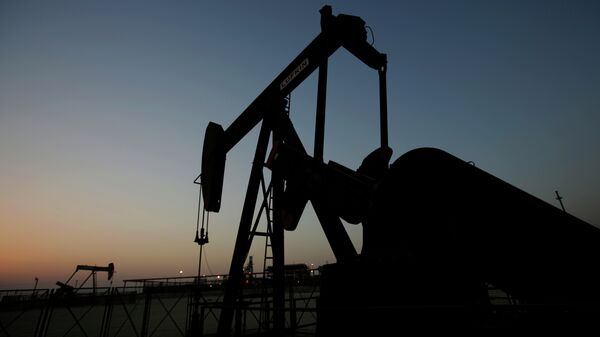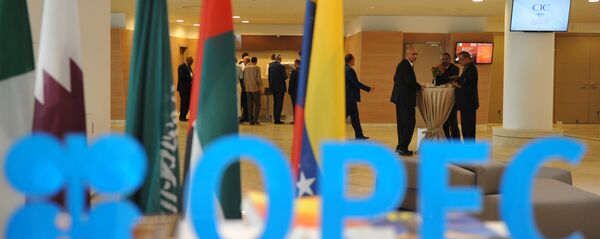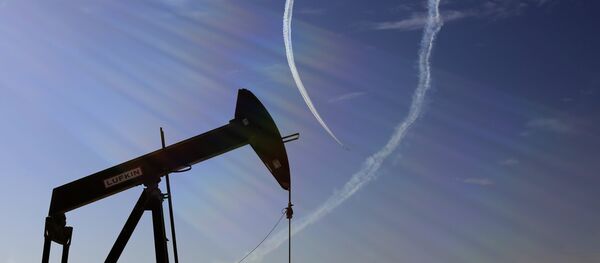Sputnik: Some experts are actually saying that Qatar's choice to leave OPEC could mean drifting into irrelevancy of the organisation, perhaps, even that other members could follow suit. What is your take on this?
They've likely become more frustrated in recent years because they have been somewhat marginalized in the decision-making process within OPEC. This statement and this decision, coming just a few days from the OPEC meeting, is really just sending a signal and highlighting that frustration, it would seem.
READ MORE: Russia, Saudi Arabia Take Control of Oil Output Ahead of OPEC Talks
Sputnik: Among the OPEC members, there are some that feel that Saudi Arabia's interests in terms of oil prices, especially under bin Salman, who wants to move Saudi Arabia away from dependency on oil, may not be the same as other members of the cartel.
Matt Smith: Yes and no. They've all got underlying prerogatives, but all of them need a higher price than where we are now. So, for example, Venezuela needs over 200 dollars a barrel to meet its budget needs; Saudi in itself needs 88 dollars a barrel to meet those budgetary needs, and so they all need a higher price, that's one thing they all have in consensus.
The thing with Saudi, though, is they are one of the leading producers in the world, the leading exporter — they have the biggest influence. So, if they're the ones that want to see a higher price, they're the ones that want to see a production cut, they're going to push for that and have the most influence; but at the same time as well they're going to have to do the heaviest lifting, because of their status within the cartel.
READ MORE: Trump Thanks Saudis for Lower Oil Prices Day After Khashoggi Case Accusations
Sputnik: It's interesting to note that there have been other countries who have left at various points in time OPEC, and then returned to OPEC. What do you make of that?
Matt Smith: We've seen other countries leave, as you mentioned; we've seen Indonesia leave and then come back again. Just with Qatar, though, it seems as though they feel like they've been isolated to some extent, not only because of not being part of that decision-making process but also because of strained relations on a political front, you know. They've got strained relations with Saudi Arabia, with the UAE, and there's been an economic embargo since last year placed on Doha because of that. There is that issue going on now.
So, we will have to wait and see, time will tell whether this is more of a temporary frustration here from them, but it seems as if just because of their role within OPEC being marginalized and just the animosity involved among some of those members, this could be a long-standing thing.
READ MORE: OPEC Weighs New Production Cuts as Oil Prices Hit 2018 Low
Sputnik: Do you think there's going to be a significant change in OPEC, in the organisation, in some of their goals because of the fact that Qatar has chosen to leave at this time?
Matt Smith: OPEC has been trying to encourage more members to join and all of these smaller members that we've seen joining in recent years, sort of Equatorial Guinea, etc., that's all being completely offset by this, as you say, 650,000 barrels of production that are being removed from the cartel because of Qatar.
One thing to remember as well, a lot of that is being exported, so it's not as if it's domestic consumption, that they are keeping it within their country. They're pushing that oil out onto the global market.
Sputnik: Do you feel that some members are better off without the organisation rather than being inside it?
Matt Smith: You would think so given that a production cut is likely to be put in place again. So, some of these members have joined in recent years and not expected to have their production curtailed.
All of these countries in OPEC are heavily reliant on crude for revenues, and so curtailing that production means curtailing their spending, their government spending. By all means going into a second production cut, which it seems that we're going to do at the end of this week with the OPEC meeting, if you are a smaller producer or, in fact, any of these producers, you're going to feel the pinch a bit.
READ MORE: Moscow Explains What's Behind US Sanctions Over Alleged Oil Supplies to Syria
Sputnik: It also comes at a very difficult time for Saudi Arabia, after the whole Jamal Khashoggi affair and the possible involvement of Crown Prince bin Salman; we're already seeing Saudi Arabia seeking closer ties with Russia, we saw that at the G20 with the high-five by Vladimir Putin with bin Salman. What can we expect in terms of Russian-Saudi ties, US-Saudi ties, what kind of impact is this whole political scene going to have on US oil prices?
Matt Smith: There are a number of different dynamics going on at the moment. The very public high-five that we saw was sending a message to the market, to various global leaders as well. All that said, the US has been putting pressure onto Saudi Arabia to keep oil prices down, the whole Jamal Khashoggi affair has only given them more leverage with that.
Really, you're going to be seeing Saudi treading a fine line here; they don't want to rile President Trump and the US, but at the same time, they ultimately want and need a higher price for their oil and to get that, they need to be in cahoots with Russia.
Views and opinions expressed in the article are those of Matt Smith and do not necessarily reflect those of Sputnik.






